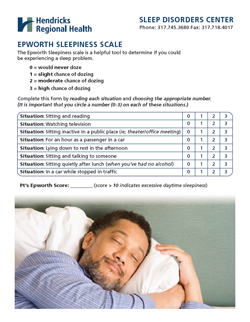
Symptoms of sleep disorders may include:
- excessive sleepiness during the day
- loud snoring
- difficulty falling or staying asleep
- nighttime or morning headaches
- nightmares or hallucinations when falling asleep
- leg jerking
- vigorous or violent movements while dreaming
Click here to learn about sleep disorder symptoms in children.
Most people experience trouble sleeping at one time or another. This is normal and usually temporary, brought on by factors like stress. But it’s not normal to regularly feel sleepy during the day, have problems getting to sleep at night, or to wake up feeling exhausted. When sleep problems affect your everyday life, it's time to take a close look at your symptoms.
Are You Getting Enough Sleep?

The Epworth Sleepiness Scale is a helpful tool for determining if you are experiencing a problem with daytime sleepiness. Click on the image to download the self-test, and then fill it out. If you rate "sleepy" on this scale, it is a good idea to talk with your doctor or contact the Hendricks Regional Health Sleep Disorders Center directly at (317) 745-3680.
The good news is with a complete and accurate diagnosis, most sleep disorders can be effectively treated or managed.
The Next Steps
Diagnosing your sleep disorder involves several steps, including a complete medical history and an exam to identify your symptoms and document your sleep history. You also may be asked to keep a sleep diary and include input from your sleep partner. Your doctor may also order one or more tests to better identify the type of sleep problem you have. This information will all be gathered so that the most effective treatment plan can be created for your unique needs.
Call to Schedule
If you have symptoms of a sleep problem, talk with your doctor or call (317) 745-3680 for more information or to make an appointment with a Sleep Specialist.
Forms & Instructions
Resources